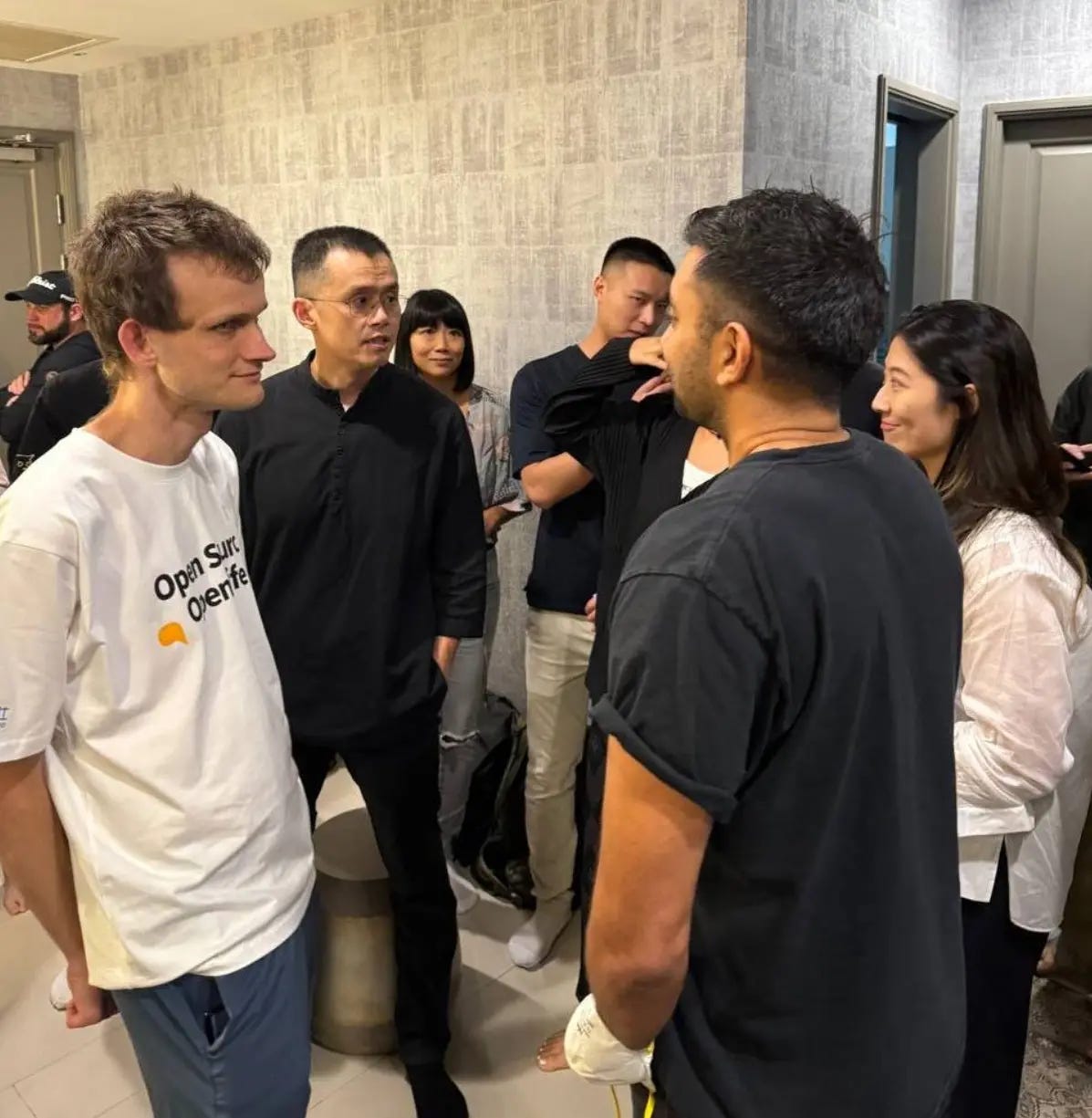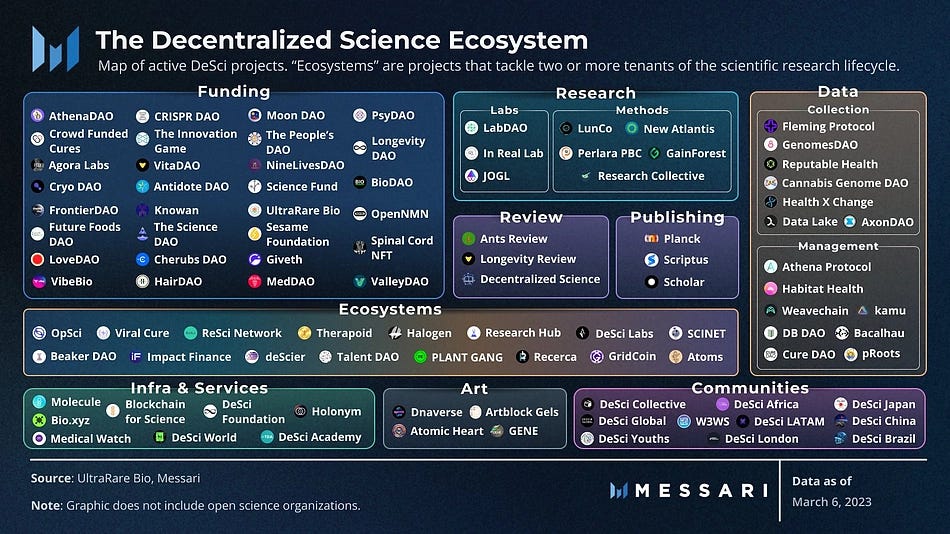Web3's Answer to Science Woes 🧬
Traditional science has a problem. Actually, several of them. And crypto might just have the solution. And it's not just about putting lab reports on the blockchain.
Happy Sunday explorers 🍻 Ready for a trip down today's Rabbit hole? DAOs are trying to cure baldness and we had to deep dive.
Consider signing up for pay-what-you-want subscription to support our work - which is possible thanks to support from readers like you.
If you want to reach out to 175,000+ subscriber community of the Token Dispatch, you can explore the partnership opportunities with us.
When former Binance CEO CZ and Ethereum's Vitalik Buterin were spotted together at a DeSci event in Thailand this week, crypto Twitter lit up with speculation.

But beyond the usual crypto celebrity watching, their presence signals something more significant.
DeSci is becoming too big for traditional science to ignore.
Imagine spending years on groundbreaking research, only to …
Pay $15,000 to publish in Nature
Wait months (or years) for peer review
Watch your discovery sit behind a paywall
See big pharma make millions while you get peanuts
Welcome to modern science.
Where great ideas often die in grant applications and brilliant researchers spend more time fundraising than researching.
But what if there was a better way?
Enter Decentralised Science (DeSci), where blockchain meets beakers.
And it's not just crypto bros playing scientist. Pfizer's involved. Scientists are on board. Even the "boring" parts of science are getting the Web3 treatment.
The valley of death ☠️
The scientific community has a dirty secret: there's a "valley of death" between basic research and real-world impact.
It's where promising discoveries die a painful death, trapped in a maze of funding bureaucracy, publication gatekeeping, and intellectual property disputes.
Why?
No funding for early-stage research
Too risky for traditional investors
Too early for big pharma
Too expensive for small labs
The result? Countless potential cures never make it out of the lab.
The science game is rigged
Let's break down why traditional science is stuck in the past.
The Money Problem
Universities take massive cuts from grants
Researchers spend 40% of their time writing applications
Only "safe" research gets funded
Young scientists can't get started
Private industry controls most funding
The Publishing Nightmare
Journals charge researchers to publish
Then charge readers to read
Peer review is slow and biased
Data stays locked away
Innovation gets stifled
What exactly is DeSci?
At its core, DeSci is the application of Web3 tools – blockchain, smart contracts, tokens, and DAOs – to scientific research.
Think of it as an attempt to rebuild the entire scientific infrastructure, from funding to publishing, using decentralised technology.
The reason? Traditional science has some serious problems: gatekeeping by journals, byzantine funding processes, and research that's locked behind paywalls. DeSci aims to fix all that.
How does it actually work?
Traditional science has some serious problems: gatekeeping by journals, byzantine funding processes, and research that's locked behind paywalls. DeSci aims to fix all that.
Let's break down the key components.
IP-NFTs (Intellectual Property NFTs)
Imagine being able to buy shares in a potential cure for cancer. That's what IP-NFTs enable. Scientists can tokenise their research, allowing anyone to invest in and own a piece of potential breakthroughs. When the research succeeds, token holders benefit.
DAOs for Science
Scientific DAOs like VitaDAO operate as decentralised research funds. Members vote on which projects to fund, and smart contracts automatically distribute resources. It's like a democratised version of the National Science Foundation, but moving at crypto speed.
Token-Powered Peer Review
Instead of waiting months for traditional peer review, platforms like ResearchHub use token incentives to speed up the process. Contributors earn tokens for reviewing papers, spotting errors, or adding valuable insights.
The money part
Here's where it gets interesting. DeSci introduces new funding models.
Quadratic Funding
A mathematical approach championed by Vitalik Buterin that gives more weight to the number of contributors than the amount contributed.
It ensures projects with broad community support get funded, not just those backed by deep pockets.
Crowdfunding
… via Tokens Projects can issue tokens representing research ownership. These can be traded on crypto markets, providing liquidity for traditionally illiquid scientific investments.
The problems it solves
Funding Bottlenecks: Traditional grants are slow and bureaucratic. DeSci enables instant, global fundraising for research.
Publication Gatekeeping: No more waiting years to publish or paying thousands in fees. Research can be shared instantly and reviewed by the community.
Data Silos: Using blockchain and IPFS, research data becomes permanently accessible while maintaining privacy through zero-knowledge proofs.
Incentive Misalignment: Instead of publishing for career advancement, researchers can earn direct rewards for valuable contributions.
The case of HairDAO
When someone tells you they're curing baldness using blockchain, it's natural to be sceptical. But HairDAO's recent success – two patents and a Manhattan lab – suggests we might need to rethink our assumptions about how science gets done.
The problem, according to DeSci World founder Joshua Bate, is that traditional science has become "crippled by pointless incentives such as gatekept data, regulatory capture and corporate greed."
In other words, science needs an update.
And that update is coming from an unlikely direction: decentralised science, or DeSci.
Take HairDAO.
Because hair loss is considered a "cosmetic condition" by government agencies, it gets almost no traditional funding.
But through blockchain-based crowdfunding, they've raised $3.3 million and are launching their first patented treatment this December.
The secret? Letting anyone contribute. Some of their best researchers are anonymous Discord users – something unthinkable in traditional academia.
It sounds crazy until you realise they're generating patents faster than established institutions.
This is possible through something called IP-NFTs (Intellectual Property NFTs), pioneered by Molecule.
Think of it as kickstarter for science: researchers can crowdfund their work, and supporters get a share of any future success.
The model is catching on. Molecule has already invested $8 million across 35 projects, from longevity research to, yes, baldness cures.
Even more bizarre? There's now a platform called Pump.science where you can trade tokens tied to specific scientific compounds.
Of course, sceptics worry that mixing speculation with science could damage research integrity.
But the traditional system isn't exactly working perfectly either. When journals charge $15,000 to publish a paper, who exactly is science serving?
Don’t Miss Out on Our Weekly Features
Connecting dots to bridge the narrative that's shaping the crypto world. Saturday analysis written by Prathik Desai 👇
Crypto world can be a maze. Lot of information, not much context. Lot of noise, not much insight. Sunday explainers written by Thejaswini M A👇
Other real world examples?
ResearchHub: The Science Social Network
Let's start with ResearchHub, arguably the most ambitious attempt to rebuild scientific publishing from the ground up. Think of it as Reddit meets arXiv, but with token incentives.
Here's how it works: Researchers upload papers, data, or start discussions. Others can comment, contribute, or validate findings.
Every interaction earns ResearchCoin (RSC), the platform's native token. But it's not just about collecting tokens – RSC holders get voting rights on platform governance and can create bounties for specific research tasks.
The clever part? By tokenising engagement, ResearchHub has created a self-sustaining ecosystem where good scientific contributions literally pay dividends.
VitaDAO: The Longevity Pioneer
When VitaDAO raised over $4 million and caught Pfizer's attention, it proved DeSci wasn't just another crypto experiment. Here's how they operate:
Treasury Management: Uses a novel "work-to-earn" model where scientists earn VITA tokens for research contributions
Project Selection: Community members stake VITA tokens to vote on research proposals
IP Management: Successfully tokenised several longevity research projects through IP-NFTs
Real Results: Already funded breakthrough research in cellular reprogramming and aging biomarkers
AthenaDAO: Women's Health Revolution
Perhaps the most compelling example of DeSci addressing neglected areas, AthenaDAO focuses exclusively on women's health research.
Current Projects: Active research into menopause, PCOS, and endometriosis
Funding Model: Combines traditional grants with token-based crowdfunding
Community Focus: Involves patients directly in research prioritisation
Impact: Already funded three major studies that traditional institutions overlooked
GenomesDAO: Your DNA, Your Data
Think 23andMe, but you actually own your genetic data.
Technology: Uses zero-knowledge proofs to maintain privacy while sharing genomic data
Business Model: Individuals monetise their genetic data while maintaining anonymity
Scale: Building world's largest user-owned genomic database
Partnerships: Already working with several major biotech companies
Molecule: The IP-NFT Pioneer
They're not just a platform – they're creating the infrastructure for scientific IP trading:
Technology: Created the standard for IP-NFTs
Scale: Facilitated over $10 million in research deals
Partners: Working with traditional biotech companies
Innovation: Pioneering "research-to-earn" mechanisms
AxonDAO: Reimagining Scientific Funding
A platform connecting research and capital through blockchain
AxonDAO disrupts traditional scientific funding by creating a direct bridge between researchers and capital. Here's what makes it unique:
Scientific IP Marketplace: Transform research into tradeable tokens through AxonDAO's app, making intellectual property instantly liquid and tradeable.
Self-Funding System: Every AXGT token transaction automatically allocates 1% to the research fund, creating a sustainable funding mechanism for new projects.
Democratic Project Selection: Token holders vote on which research projects receive funding, replacing traditional academic gatekeepers with community governance.
Multi-Asset Backing: The ecosystem is supported by diverse revenue streams including DeSci project earnings, IP NFTs, cryptocurrencies, and data assets.
Direct Research Investment: With a $53M market cap and 1B total supply, AXGT tokens offer direct exposure to scientific innovation while providing governance rights.
ValleyDAO: Engineering Biology
Focused on synthetic biology for sustainability.
Projects: Developing engineered bacteria for pollution cleanup
Model: Hybrid funding combining grants and token sales
Innovation: Created first DAO-operated wet lab
Impact: Two successful pilot programs in environmental cleanup
PumpScience: The Experimental Edge
Yes, they're using memecoins for science.
Concept: Trading tokens tied to specific research compounds
Current Focus: Longevity experiments
Tokens: RIF (Rifampicin) and URO (Urolithin A)
Results: Successfully funded three pilot studies
The technical stack
These platforms aren't just websites with tokens slapped on. They're using sophisticated blockchain technology.
Smart Contract Layer
Most built on Ethereum for IP-NFTs and governance
Layer-2 solutions for lower transaction costs
Custom oracles for verifying research milestones
Data Management
IPFS for storing research data
Arweave for permanent storage of key findings
Zero-knowledge proofs for sensitive data
Token Economics
Governance tokens for platform decisions
Utility tokens for platform services
IP-NFTs for research ownership
Quadratic funding for grant distribution
What's fascinating isn't just what these projects are doing individually, but how they're interconnecting.
VitaDAO participants often cross over to AthenaDAO.
ResearchHub discussions lead to Molecule deals. It's becoming an ecosystem, not just a collection of projects.
But perhaps most importantly, these projects are proving that DeSci can succeed where traditional science struggles.
Speed: HairDAO filed patents faster than traditional pharma
Cost: ResearchHub publications cost 90% less than traditional journals
Engagement: Higher community participation than traditional research
Impact: Funding research traditional institutions won't touch
Crypto heads are all support
Coinbase CEO Brian Armstrong sold 2% of his Coinbase stake to fund ResearchHub, his "Reddit for science" platform where researchers earn tokens for contributions.
Vitalik has been architecting DeSci's theoretical foundations with concepts like quadratic funding.
In a recent Molecule podcast, Buterin outlined his vision for DeSci: using zero-knowledge proofs for data privacy, soulbound tokens for peer review, and DAOs for research funding.
It's not just theory – he's actively advising projects like VitaDAO and participating in DeSci events globally.
And CZ, fresh from his Binance exit, is exploring DeSci investments.
Why are crypto's heavyweights suddenly interested in fixing science?
Perhaps because they understand incentive problems better than most. They've spent years building systems where incentives need careful balancing – exactly what traditional science struggles with.
The Token Dispatch View 🔍
When three of crypto's most successful entrepreneurs pivot towards science, it's worth paying attention. They're not just bringing capital – they're bringing experience in building decentralised systems that work at scale.
And they're not alone. Mark Cuban has been asking questions about DeSci. Balaji Srinivasan is talking about scientist tokens. The crypto billionaire class seems to have collectively decided that fixing science is their next big mission.
The irony? These crypto natives might actually understand science's incentive problems better than many scientists do. After all, they've spent years building systems where incentives have to be carefully balanced.
Their timing couldn't be better. Traditional science is plagued by gatekeeping, expensive publishing fees, and funding bottlenecks. DeSci platforms are addressing these issues with tools like IP-NFTs for research ownership and token incentives for peer review.
As Joshua Bate of DeSci World puts it: "The goal is to move far beyond speculation and create a new era of public infrastructure that makes science more accessible and better incentivised to create real breakthroughs."
With crypto's biggest names now backing that vision, DeSci might just have the resources and technical expertise to make it happen.
Week That Was 📆
Friday: ETH Elephant Finally Awake? 🐘
Thursday: Code No Criminal 🌪️
Wednesday: SEC Out, CFTC In? 🔄
Tuesday: When Pump.fun Is No Longer Fun 🥵
If you want to make a splash with us, book a demo call 🤟
You can check out partnership opportunities🖖
This is The Token Dispatch find all about us here 🙌
If you like us, if you don't like us .. either ways do tell us✌️
So long. OKAY? ✋










As someone new to crypto, most content goes way over my head. Token Dispatch breaks everything down in a way that doesn't make me feel stupid. Plus, the writers actually seem to care about helping people understand this space.